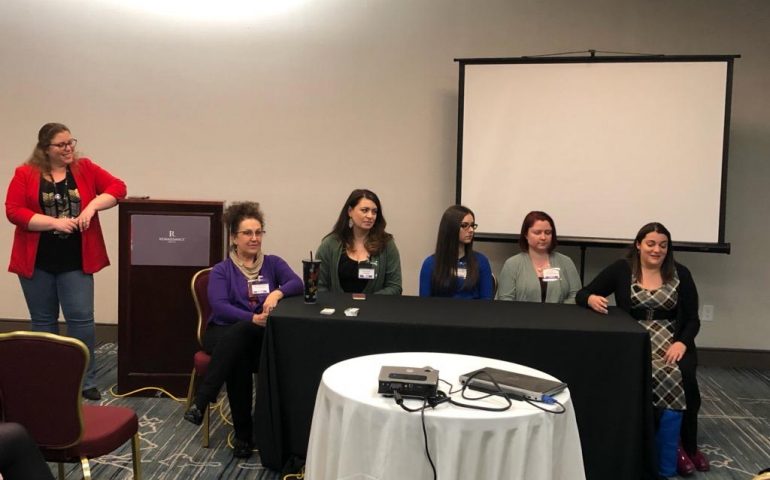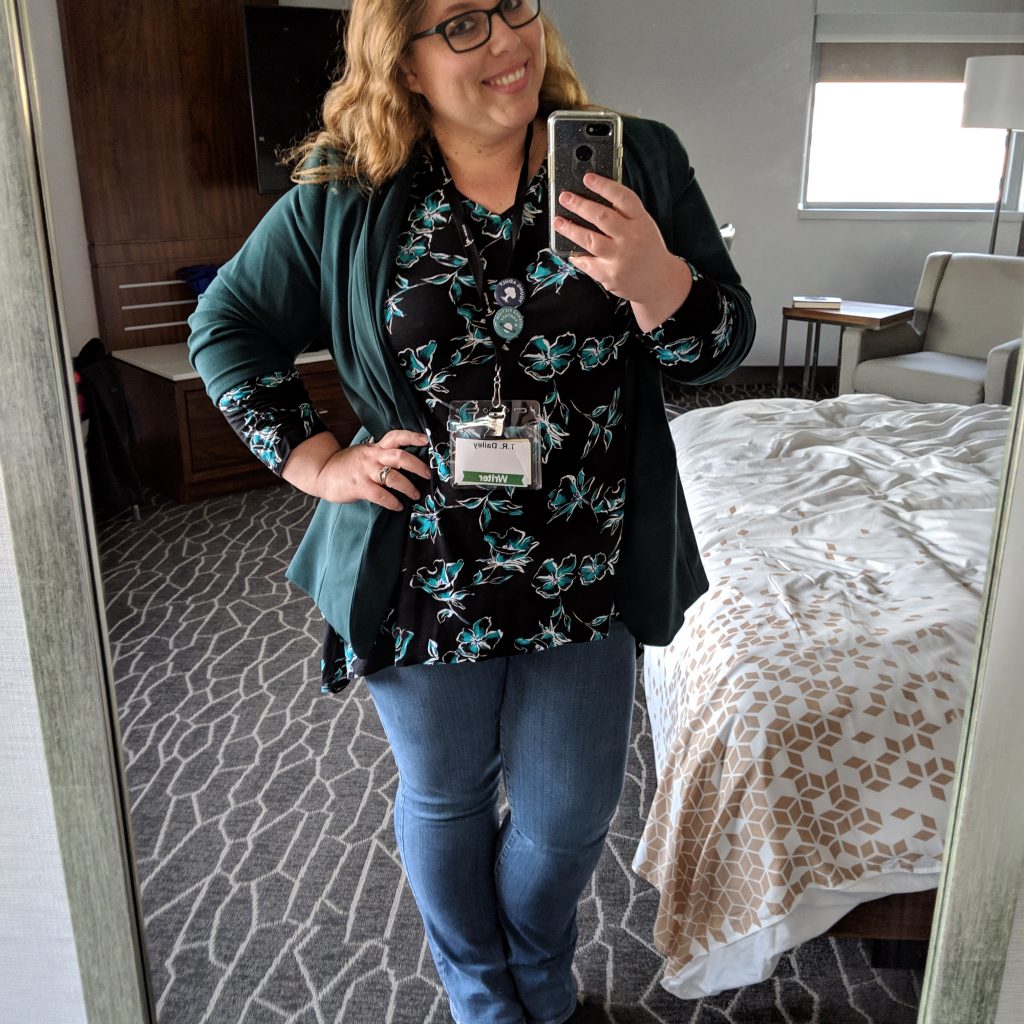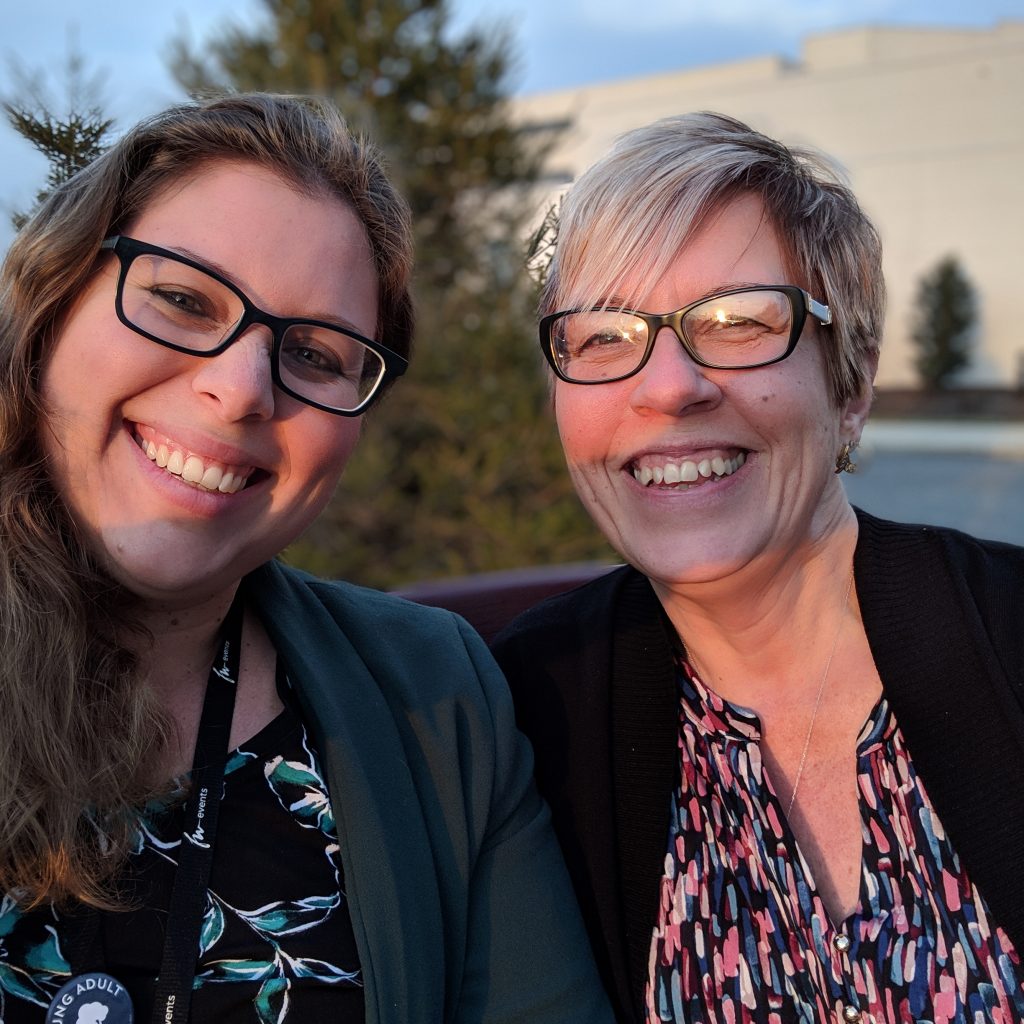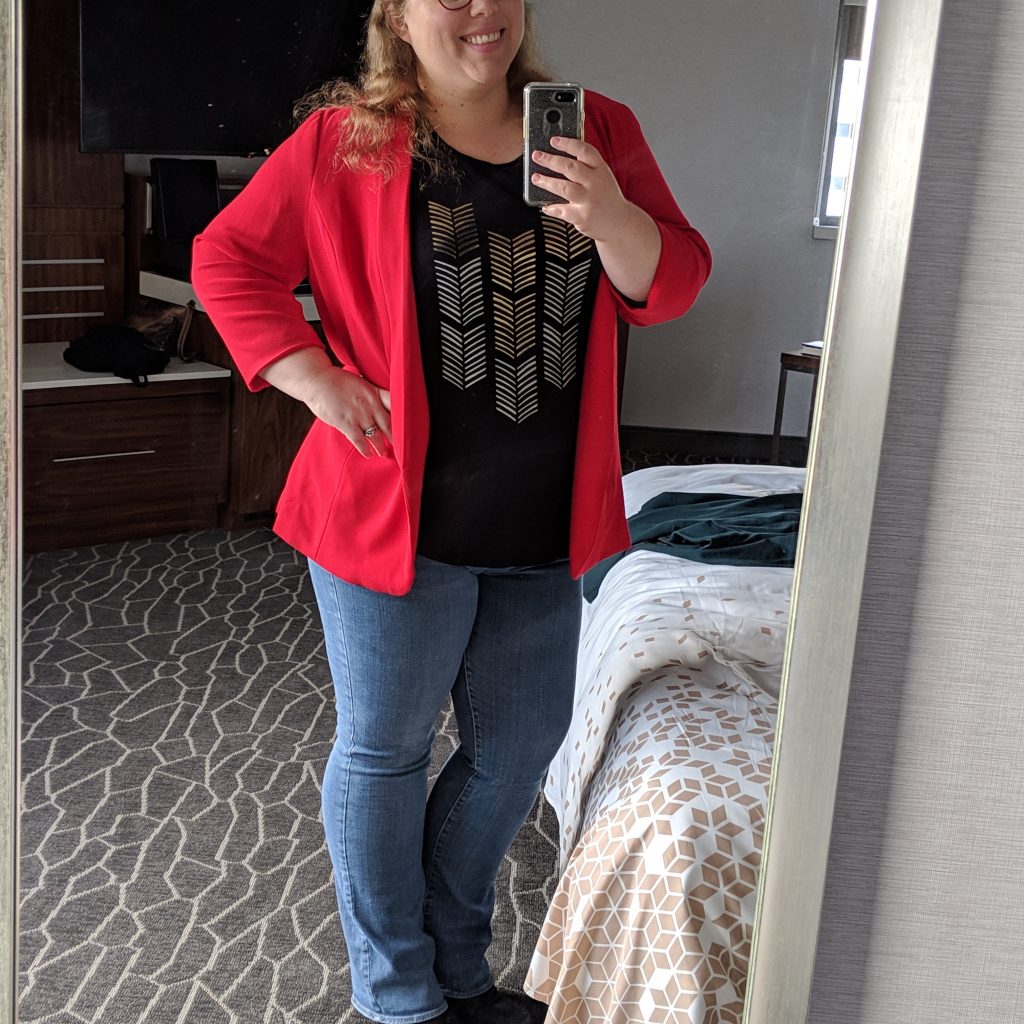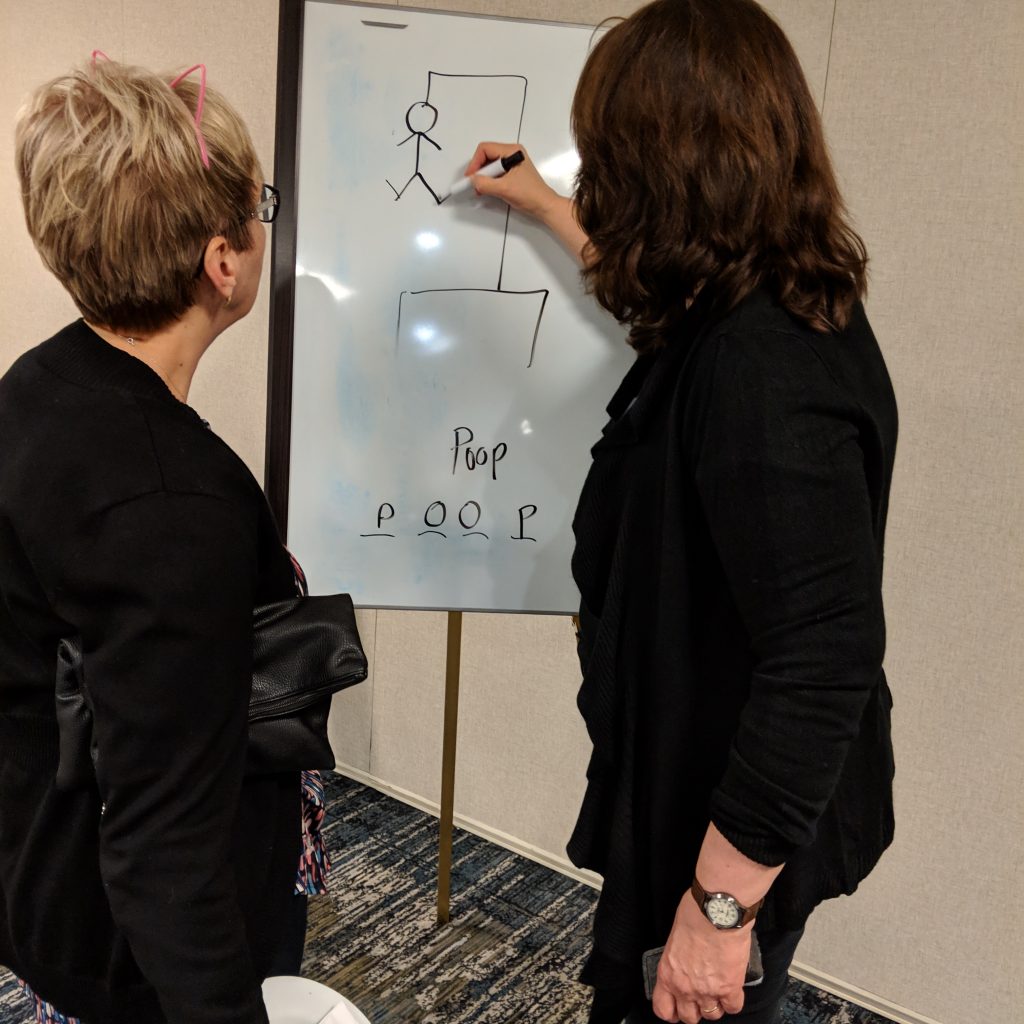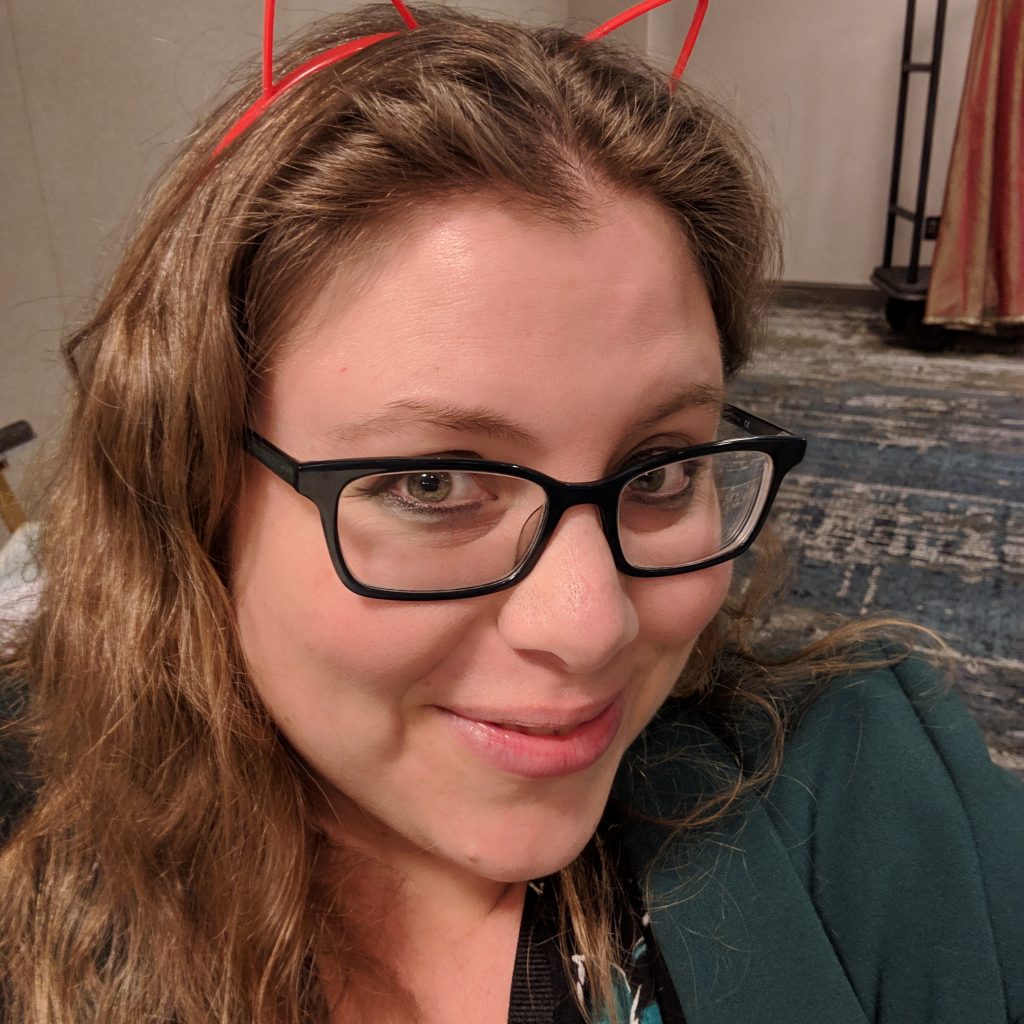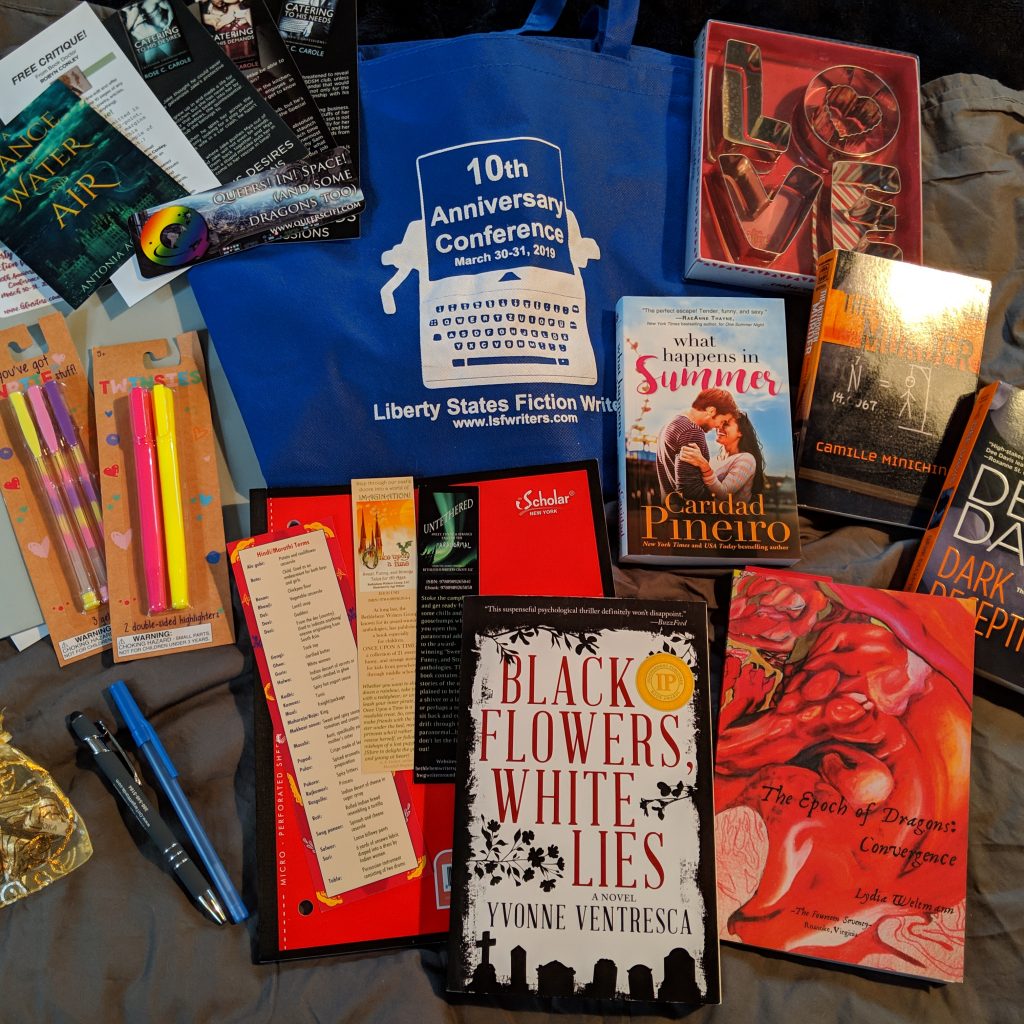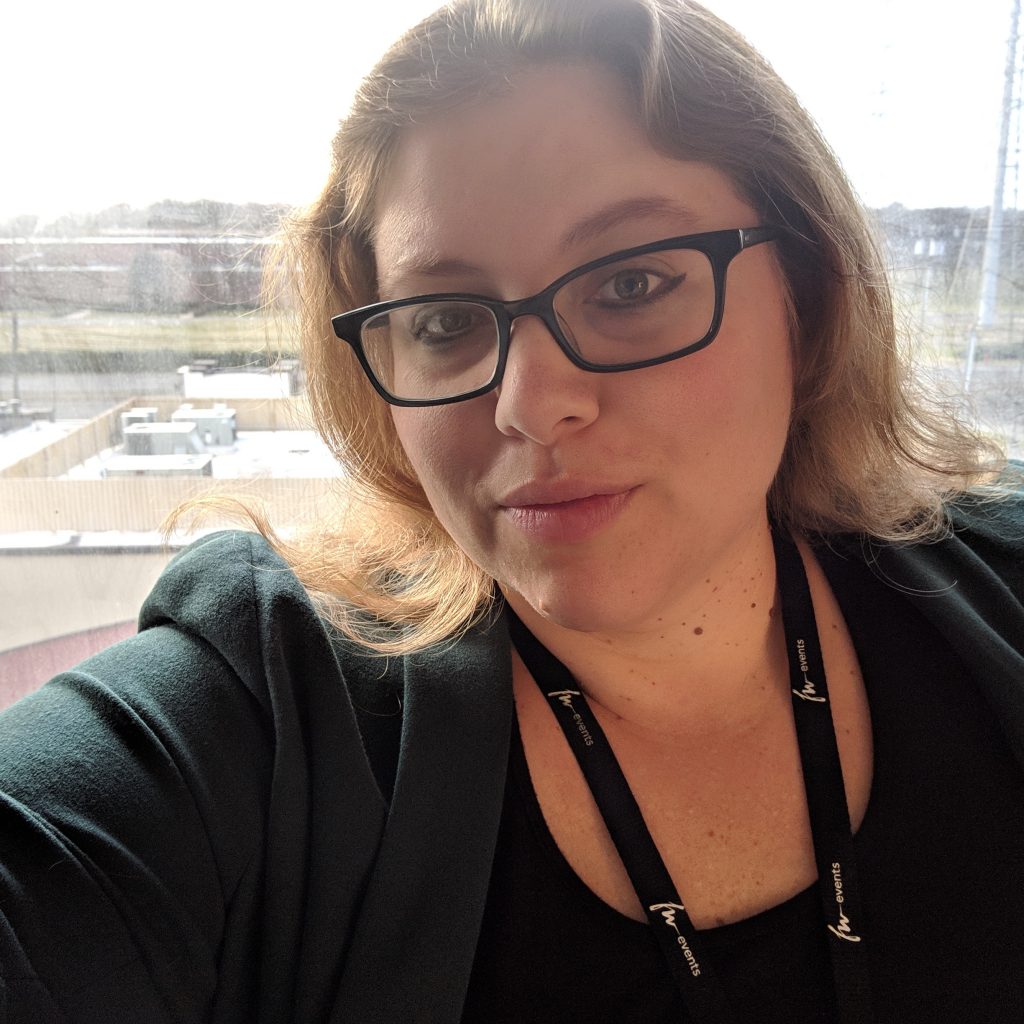This will be the sixth conference I’ve attended, and my second for LSFW. There’s a big difference between big conferences and small ones. The best thing that LSFW offers is that it’s not a *huge* conference so there are a lot of opportunities to talk with people, including authors, agents, and even the keynote speakers. At big conferences like the Writer’s Digest Conference (which I’ve attended twice), you get overloaded with great information, but you have to make the opportunities to talk to people yourself. You have to be hungry. And that’s not the right environment for everyone. At LSFW, there are always plenty of opportunities to chat and have questions answered by industry professionals.
This conference provides quite a few highlights. They have a buffet lunch and dinner on Saturday, and breakfast on Sunday during the keynotes. Plu there’s an agent pitch session available at no extra cost and a party on Saturday night after the book fair closes. This year’s Saturday night event was a wonderful game night with prizes, gift basket raffle giveaways, a cash bar, and an overwhelming table of decadent desserts.
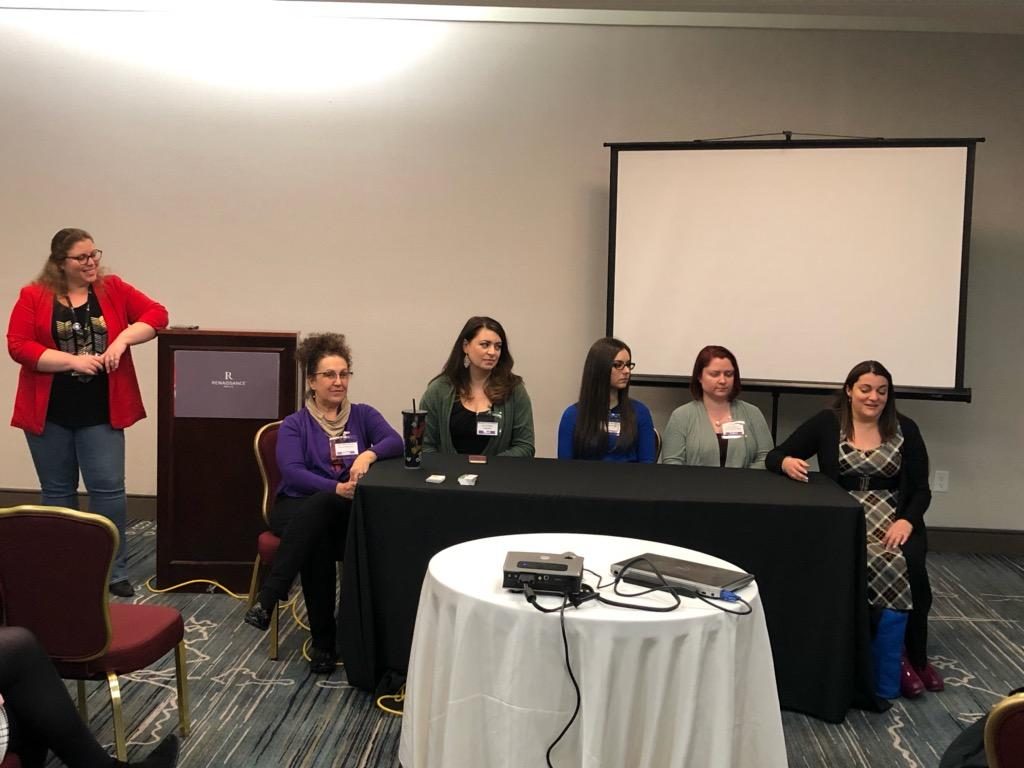
One of my personal favorite moments from this weekend was that I got to moderate my first panel – with all the agents and editors!
Here are some of my notes from the conference panels I attended. My personal favorite was Sonali Dev with Culture Building is Not Just for Multi-Culturals.
How to Deal with Press and Reviews
by Jacqueline Cutler, book critic
- Book critic from New York Daily News and New Jersey Star Ledger
- Some newspapers don’t consider self-published works to review, but will consider small press
- Bought Press and Kirkus Reviews
- Won’t read other reviews before writing her own
- She gets 20 books a day to review. She’ll spend a few hours with each book to consider it. Unless it’s from a verifiable Jersey connection, then she’ll read it. She has about 30 books she has to properly read and review per week.
- Earned media – no payment, critics choose to write it
- Dos and Don’ts of talking to book critics
- Know who you’re pitching. Know the column, know what they want
- Have your assets ready, have a horizontal photo of yourself – high res jpeg with high dpi.
- Don’t text them. Don’t reach out on LinkedIn or on Twitter. You can ask a “may I send you…” on LinkedIn though. But don’t go full on pitch mode immediately.
- Don’t attach pdf on initial email, or any art.
- Don’t argue with the reporter. If they say no, don’t go over their head.
- Don’t stalk the critic.
- DO write a clear pitch, have fun with it, and don’t make it too long. Include your name, email, number, genre, credit for who took the photo, and titles of previous books if you have them. She doesn’t feel obligated to look at authors who write 15 books a year, but feels more lesser often published writers.
- Once a month she does author profiles and Q&As. Be natural, know what lines you don’t want to cross. And don’t ask for the questions they’ll ask ahead of time either. Don’t send “talking points” ahead of time. Be prepared to answer common and expected questions like where you got started, where your ideas came from, and information about your book. They’ll want to talk about characters, success as an author, plot, etc. If they begin recording, you can too.
- There’s not that many newspapers or magazines that do book reviews anymore. Times, Post, Star Ledger, and People are a few.
- Muck Rack – a good place to check on journalists being legit. Find their work to look at.
- Some reviews are 15 words long!
- If you sell a book, publishers will send books out to reviewers.
- Reviewers with blogs – you can contact the blogs especially for specific genres, and ask them to review your book.
- Amazon almost never gets number of pages right.
- Don’t tell the reviewer what they can talk about (or what not to).
- Know your reviewer’s name!
- While pitching to a reviewer, give them just enough to make them interested. Shorter than back cover copy!
- Don’t need blurbs.
- First line is VERY important for a reviewer’s consideration. For example, there was one book she knew she didn’t want it after the first line – only read 2 pages more.
- Interviews tend to be better in the author’s home, where they’re more comfortable. If this is an option, she likes to take it.
Keynote
with Deb Werksman, editorial director at Sourcebooks
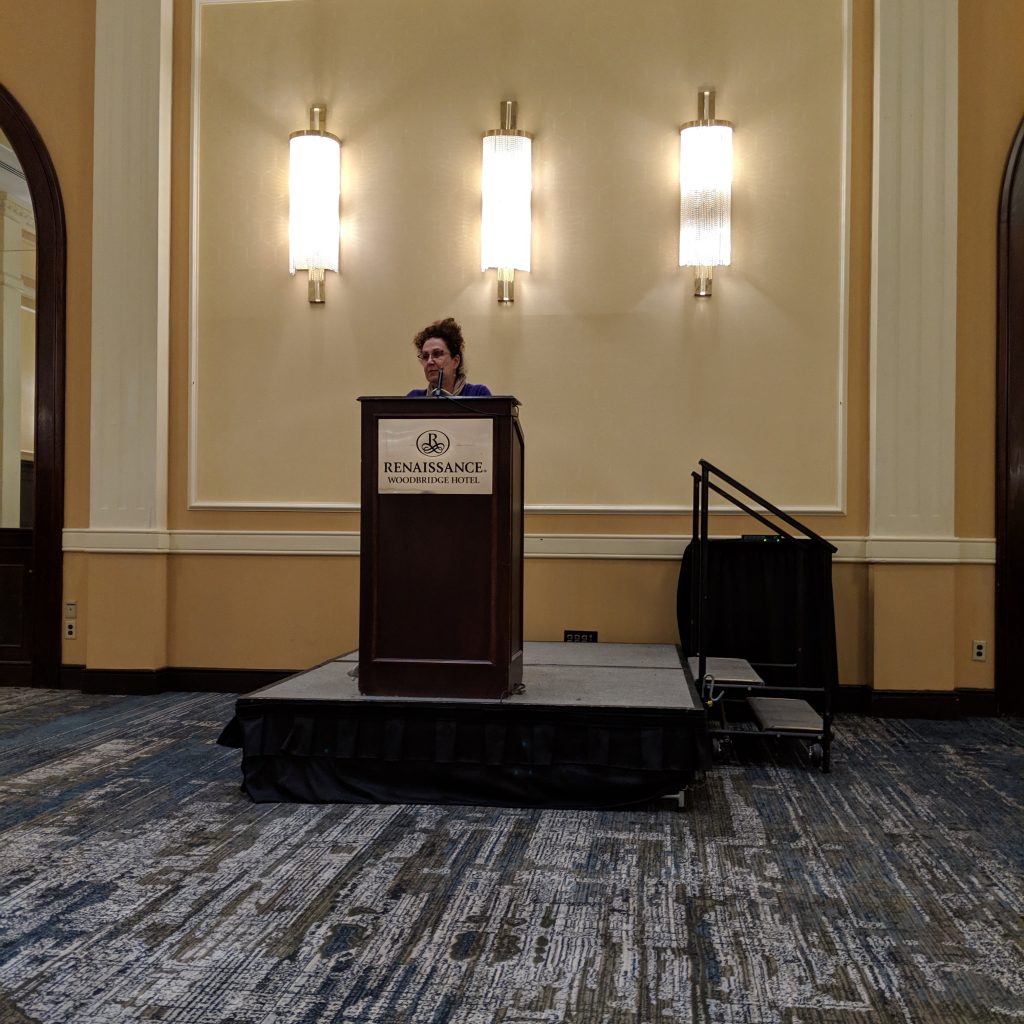
You cannot market your way to success with a bad book
- It’s about positioning and branding.
- Cultivate your readership!
- Support comes from editorial.
- To be in control, self-publishing is more for you. Self-pub can help promote commercially pubbed books.
- “Faster is not always better. Better is always better.” Here, she’s talking about feeling pressure from fans and publishers to get the next book out. The sweet spot is to write from the heart – and eventually you’ll have “brand consistency” to think about too.
- Deciding which genre to push first – what is salable in this market. What are the most original, market-worthy ideas you have? What are you using just to hone your craft?
- If your MS is finished, should you wait till it’s perfect or pitch it earlier? She says to wait until it’s fully finished and in good shape. Word count requirements should be considered. But if you need 3 months? That’s fine. Take the time.
- Do’s and Don’ts of Giving a Pitch
- Know thyself.
- Have a publishing history? Use it! Lead with that. If you have lots of finished manuscripts? Say that. Know your subgenre and hook.
- Plot summary is not a pitch. Pitch is a couple hooky sentences.
- Publishing in next 5 years. She sees a blockbuster every couple of years. The self-pub gold rush is over. She believes people are returning to traditional for distribution purposes.
- Readership only on phones doesn’t create nor cannibalize other book mediums.
- Trends – she’s seeing a lot of romance, especially with happy endings. And a lot of apex predator shifters in romantic suspense, the every-woman heroine, Scottish Highland is still big, sexy regency, forgotten women (stories of real women forgotten by time). In narrative nonfiction – radium women are big. A lot of interest in elaborate worlds in YA Fantasy and YA Horror.
- 3rd year in a row that hardcover books have outsold ebooks
- YA is 12% of ebook sales. Lots of print books being sold in the YA world. She believes that carrying a copy of a book around with them, in front of friends and on campus, helps get interactions from other teens. She thinks they’re looking for reasons to get off their phones.
Positioning Power
with Deb Werksman, editorial director at Sourcebooks
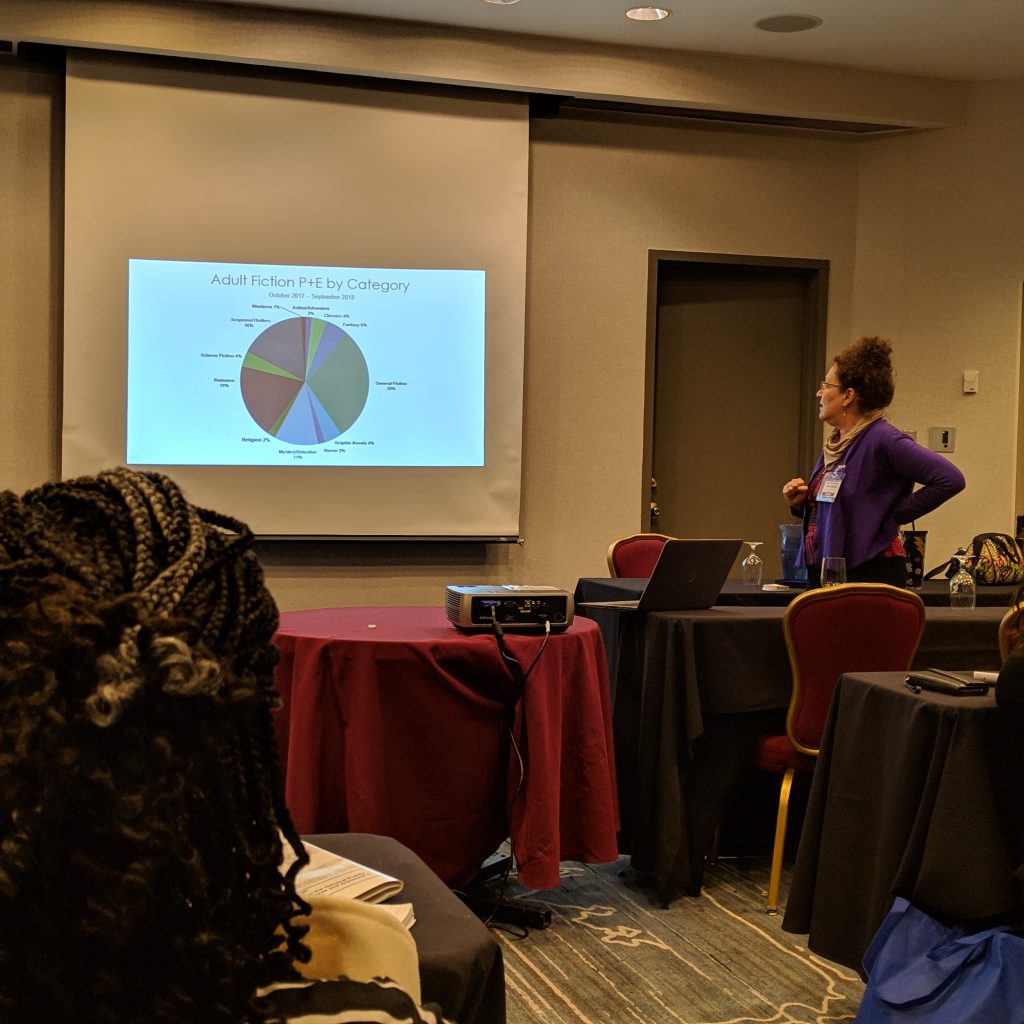
- There are 9 imprints at Source Books with 150+ bestsellers
- Romance POS in 2018 was down 11.9%
- Not a bestseller strategy
- EBook sales for all romance publishers was down 20.5% but she believes this has to do with Amazon’s algorithms
- How story is delivered
- Hardcover continues to outperform
- A million self-pubbed titles last year alone
- Where story is delivered
- Borrowing from libraries and in book & mortar stores
- B&N is the most common for sales, then Walmart is second.
- Online Amazon is first, then B&N
- YA sells well in Target
- Making Book Successful
- What makes readers buy book – story, description, author, price, and recommendations
- 25 – 34 is the age of most romance readers right now. 35-44 is next, then 18-24
- 62,235,275 titles are available right now in the US.
- Kirkus, Booklist, Library Journal – check these for starred reviews.
- Marketing
- It takes 3-5 impressions before someone acts
- Forget about swag, it doesn’t boost too much
- Co-op, trade shows, conferences, promotions – will help
- Trade shows like Book expo, bologna, American Library
- Good examples of marketing include an ARC with etched box, selling a book for puppies that included the author delivering bones for puppies in shelters that had the reader names on the bones, and one ARC that included photos on locations in England and Scotland. Those things make it feel personal.
Keynote
with Sonali Dev, award-winning author
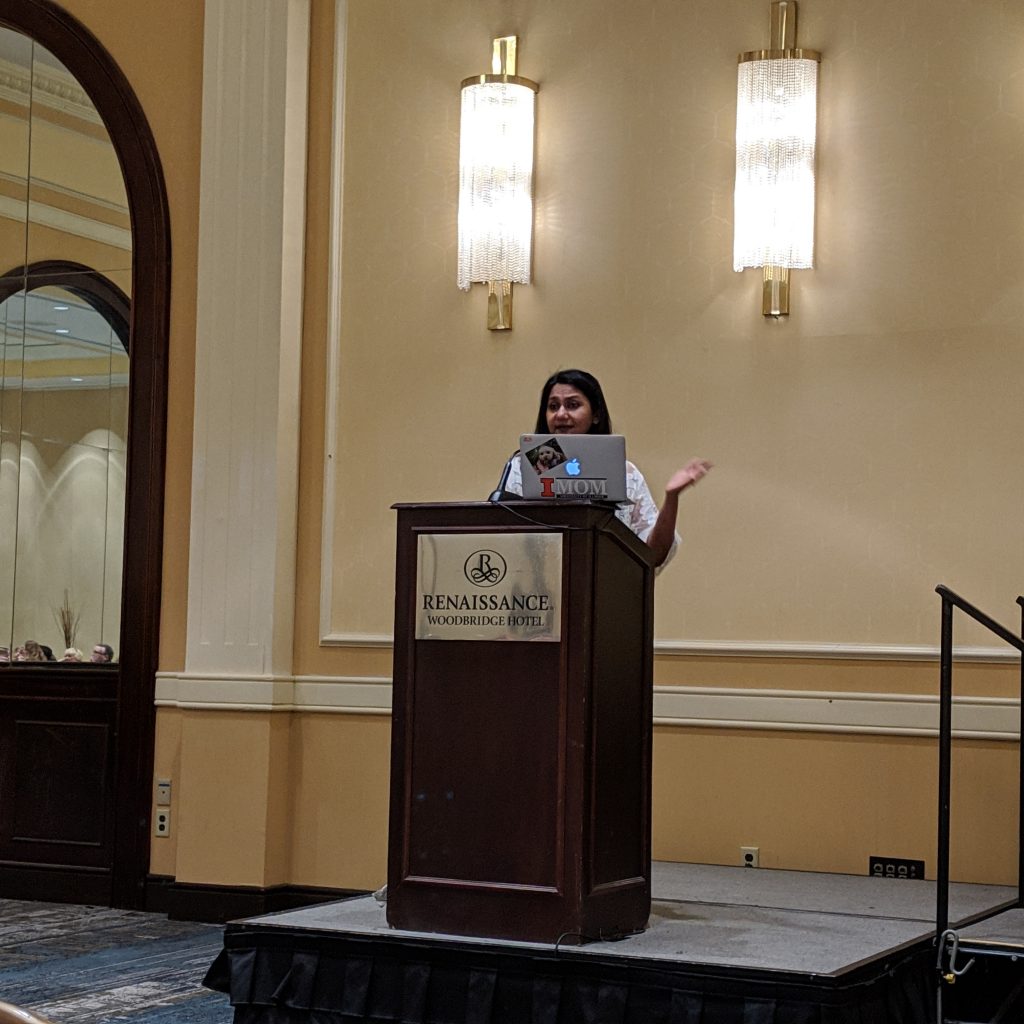
“Humans started talking when they needed to negotiate. That’s where language started… [but] There are just some things you cannot change. And that’s how people are silenced.”
That moment you realized you wanted to write… it’s because you wanted to be heard.
Culture Building is Not Just For Multi-Culturals
with Sonali Dev, award-winning author
- Stories are wanting to escape one world and get into another world
- Envision a book (HP, Twilight, Hunger Games) and you envision the world and a feeling of being in a world other than your own.
- You remember speeches because a world was created for you, it gave you something to inhabit. Not just the inspiring parts.
- You care about a place because you care about the character
- Consider the definition of culture – a set of shared beliefs and values passed down through generations (and more!)
- Hook reader into culture through setting. How many details do you know?
- Culture is engrained inside of so much that if you wake someone up in the middle of the night – that is what they think of. A piece of their culture.
- Take a toy you coveted, describe it. What is it? What does it do? Then what does that mean about that child? (Ex. an Easy Bake Oven might mean independence to cook your own dessert). Then consider describing the same toy to a child of a different culture – does the description change?
- Readers only needs to see the tip of the iceberg – communicate only the top. But authors need to know ALL of it.
- Below are some questions to ask yourself when world-building in your book.
- Manners
- How children behave? How people are dressed in different situations? What does an elder look like? What is chivalry? What is marriage like – especially how they talk and refer to each other?
- Who has the voice in the marriage? Ex. Orthodox Indian culture husband and wives don’t say each other’s names.
- When reference or manners matter is when it’s in opposition to what a character wants, a character in opposition to that world.
- How do inter-class treat each other? Strangers greeting versus friend’s hellos and goodbyes. Do you say thanks, please, etc. especially to wait staff or lower cultures?
- Relationships
- Age of marriage, divorce rate. Do neighbors mingle? What’s shameful or envious of other people?
- Legacies and Land
- Homes, terra, do they own land? How do they feel about their home? Who “keeps the house” (women?).
- Dev mentions her grandmother “cooked like she was going to war.” In India, man gets validation from going to work, women got it from keeping the house clean or making tasty food (if it was burnt, it was the end of the world for her because it meant more than just some burnt food.)
- How do you/your MC get validation at home? Who is royalty?
- Defy expectation: you’re not who society wants you to be. Staking claim in your country. “First Generation” – doesn’t mean a thing unless you’re an immigrant.
- Homes, terra, do they own land? How do they feel about their home? Who “keeps the house” (women?).
- Celebrations and Mourning
- Why community gathers. Who organizes the gatherings? Who decides? What’s the focus – food, drink, dancing, religious aspects? Focus on keeping people in or out? Is there belief in after-death?
- For Mourning she had examples: Some people can’t speak because it showed weakness during the loss. While other people hire shriekers/wailers to help you understand your own pain/loss.
- Belief
- What is sinful/shameful? What is honorable? What is worth dying for? What is after death?
- Susan Elizabeth Phillip or Christine Higgins are examples of classically white culture.
- Remember conflict is everything, opposition creates tension. Story is transformation. Plot is the event that causes transformation.
- Convince the reader “that’s what people do”.
Fixing Any Plot Problems with The Five W’s
with Stacey Wilk, author
This particular presentation was much different than I was expecting. She spent most of the time using audience examples, which was great and turned it into a workshop for a few writers, but it left me with very few notes on the topic.
- If you’re stuck, it’s because you don’t know enough about your character
- Conflict drives the story. Internal and external goal (usually, best if against each other).
- If you don’t know what the character will do under pressure, it’s because you don’t know who they are.
- Most plot issues can be fixed by asking questions about the character. The Who, What, When, Where, Why, and even How about the character.
- They can think it, they can say it, they can argue about it.
- You can never have too much conflict
- Reader gets sucked into conflict, we’re afraid of it because we love our characters
- For example, if you don’t have enough conflict. Ask yourself what does your character want? What are things she does to make him heard?
- What are her hobbies? What are her personality traits?
Overall, it was a great conference. I loved getting to see all my friends again, came home with a great haul, and got to test out some new outfits!
